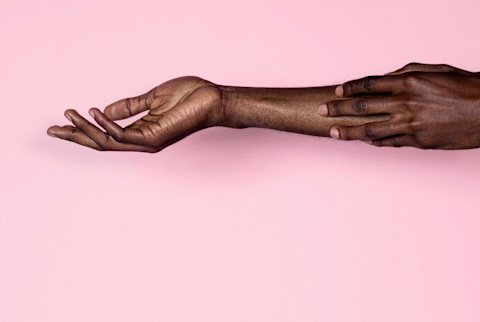How's Your Circulation? A Vascular Biologist's 2 Easy Tricks To Self-Assess

We know that blood circulation is important: The circulatory system1 is an incredible network of blood vessels that nourishes the body's cells through the beating of the heart, and proper blood flow helps deliver oxygen and nutrients throughout. Not to mention, experts have demonstrated the link between vascular health and overall well-being—considering your body contains a vast, 60,000-mile network of blood vessels, your vascular system is important to keep top of mind.
So how can you make sure your circulation is in tiptop shape? While technologies like angiograms (where an X-ray takes pictures of your blood vessels) and flow-mediated dilation are typically used to determine vascular health, William Li, M.D., a physician, vascular biologist, and author of Eat To Beat Disease, says a few self-checks can offer clues as well.
On the mindbodygreen podcast, he shares two quick methods for identifying the state of your circulation, and they're simpler than you think.
How to check the state of your circulation.
First up: Check your eyes. He explains: "Some areas to check your circulation [are] actually the whites of your eyes, like the fleshy part underneath your eyelid. You can actually see how well your blood vessels are there." That's because high blood pressure can potentially cause damage to the retina, a condition known as hypertensive retinopathy.
Of course, broken blood vessels in the eye are quite common and don't always signal an underlying issue (most of the time, they happen due to things like tugging on the eye area or intense coughing, sneezing, or even laughing). But if it happens a bunch and you're at all concerned, it may be worth getting it checked out.
The second (and, arguably, the easiest) method is to focus on your skin tone. According to Li, "[the] coloration of our skin is due to good circulation." So how can you test your skin for circulation clues? It turns out, it's pretty simple: "You can press your skin to see if it blanches," says Li.
See, when you press down firmly enough, you'll block the blood flow. As a result, the area you're pressing might drain of color. When you release the pressure, he explains, look for how quickly it bounces back: "What you're looking for is changes in sensation and feeling," Li notes.
Meaning, if your usual skin tone reappears quite rapidly, that's a pretty good sign your blood can move freely through the vessels. If it takes a while (as in more than a few seconds), that could be a sign your circulation might not be up to par.
The takeaway.
While it's always a good idea to speak with your doctor if you have questions about your circulation, Li's tricks for assessing it at home may offer a helpful start. And if you're looking for ways to enhance your circulation? You can always increase your supply of Li-approved foods for better blood flow.
